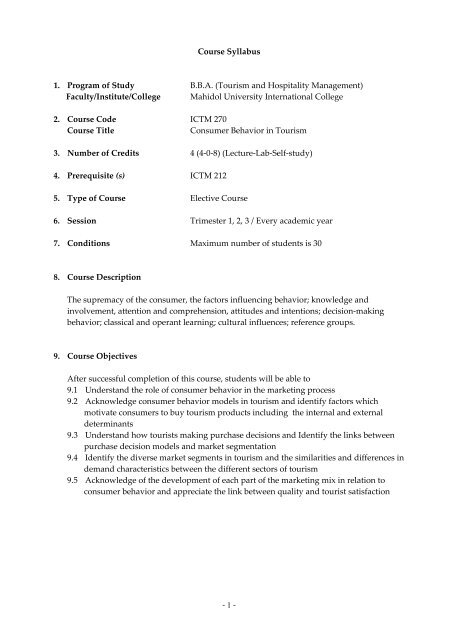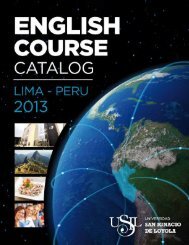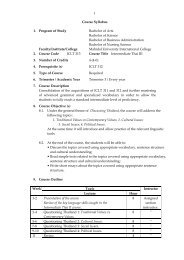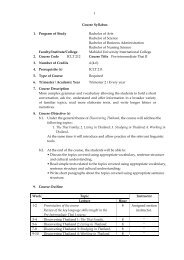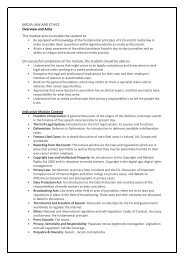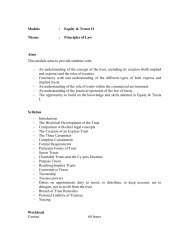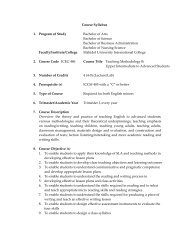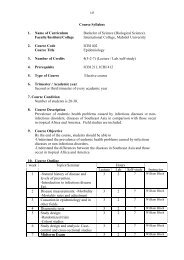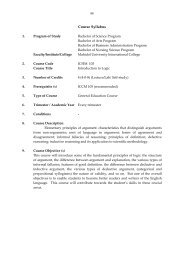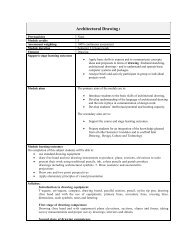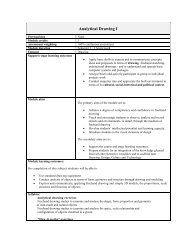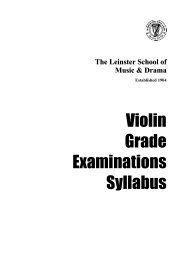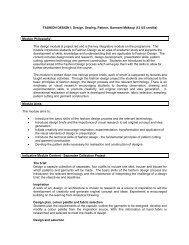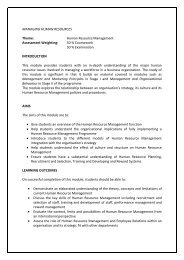Course Syllabus - Mahidol University International College
Course Syllabus - Mahidol University International College
Course Syllabus - Mahidol University International College
You also want an ePaper? Increase the reach of your titles
YUMPU automatically turns print PDFs into web optimized ePapers that Google loves.
<strong>Course</strong> <strong>Syllabus</strong><br />
1. Program of Study B.B.A. (Tourism and Hospitality Management)<br />
Faculty/Institute/<strong>College</strong> <strong>Mahidol</strong> <strong>University</strong> <strong>International</strong> <strong>College</strong><br />
2. <strong>Course</strong> Code ICTM 270<br />
<strong>Course</strong> Title<br />
Consumer Behavior in Tourism<br />
3. Number of Credits 4 (4‐0‐8) (Lecture‐Lab‐Self‐study)<br />
4. Prerequisite (s) ICTM 212<br />
5. Type of <strong>Course</strong> Elective <strong>Course</strong><br />
6. Session Trimester 1, 2, 3 / Every academic year<br />
7. Conditions Maximum number of students is 30<br />
8. <strong>Course</strong> Description<br />
The supremacy of the consumer, the factors influencing behavior; knowledge and<br />
involvement, attention and comprehension, attitudes and intentions; decision‐making<br />
behavior; classical and operant learning; cultural influences; reference groups.<br />
9. <strong>Course</strong> Objectives<br />
After successful completion of this course, students will be able to<br />
9.1 Understand the role of consumer behavior in the marketing process<br />
9.2 Acknowledge consumer behavior models in tourism and identify factors which<br />
motivate consumers to buy tourism products including the internal and external<br />
determinants<br />
9.3 Understand how tourists making purchase decisions and Identify the links between<br />
purchase decision models and market segmentation<br />
9.4 Identify the diverse market segments in tourism and the similarities and differences in<br />
demand characteristics between the different sectors of tourism<br />
9.5 Acknowledge of the development of each part of the marketing mix in relation to<br />
consumer behavior and appreciate the link between quality and tourist satisfaction<br />
- 1 -
10. <strong>Course</strong> Outline<br />
Hours<br />
Week Topics Lecture Lab Self‐<br />
Study<br />
Introduction to the module& The history of 4 ‐ 8<br />
1 tourist behaviors<br />
Instructor<br />
Muangasame<br />
, K.<br />
2<br />
3<br />
Main Concepts in consumer behaviors &<br />
Motivators<br />
Determinants and Models of the purchase<br />
decision‐making process<br />
4 ‐ 8<br />
4 ‐ 8<br />
4 Typologies of tourist behavior and segmentation 4 ‐ 8<br />
5 Mid‐term examination 4 ‐ 8<br />
6<br />
The nature of demand in different segments of 4 ‐ 8<br />
tourism market<br />
7<br />
Consumer behavior and markets in the<br />
4 ‐ 8<br />
different sectors of tourism)<br />
8<br />
Researching tourist behavior‐ marketing<br />
4 ‐ 8<br />
research<br />
9 The marketing mix and tourist behavior 4 ‐ 8<br />
10<br />
The emergence of new markets and changes in 4 ‐ 8<br />
tourist demand<br />
11 Quality and tourist satisfaction 4 ‐ 8<br />
Total 44 0 88<br />
Final Examination<br />
NB. The course is subject to change without prior notice to fit the changing tourism circumstances.<br />
11. Teaching Method (s)<br />
11.1 Lectures<br />
11.2 Tutorial discussions<br />
11.3 Problems and exercises<br />
12. Teaching Media<br />
12.1. LCD overhead projector<br />
12.2. PowerPoint<br />
12.3. Multimedia resources<br />
12.4. Handouts<br />
12.5. Text books<br />
- 2 -
13. Measurement and evaluation of student achievement<br />
Student achievement is measured and evaluated by<br />
13.1 the ability in understanding the role of consumer behavior in the marketing<br />
process.<br />
13.2 the ability in acknowledging consumer behavior models in tourism and identify<br />
factors which motivate consumers to buy tourism products including the<br />
internal and external determinants<br />
13.3 the ability in understanding how tourists making purchase decisions and Identify<br />
the links between purchase decision models and market segmentation<br />
13.4 the ability in identifying the diverse market segments in tourism and the<br />
similarities and differences in demand characteristics between the different<br />
sectors of tourism<br />
13.5 the ability in acknowledging of the development of each part of the marketing<br />
mix in relation to consumer behavior and appreciate the link between quality and<br />
tourist satisfaction<br />
Student’s achievement will be graded according to the faculty and university standard<br />
using the symbols: A, B+, B, C+, C, D+, D, and F.<br />
Students must have attended at least 80% of the total class hours of this course.<br />
Ratio of mark<br />
1. Class Participation 15%<br />
2. Mid‐term Examination 30%<br />
3. Assignment 25%<br />
4. Final Examination 30%<br />
Total 100 %<br />
<strong>Course</strong> Evaluation<br />
14.1. Students’ achievement as indicated in number 13 above.<br />
14.2. Students’ satisfaction towards teaching and learning of the course using<br />
questionnaires.<br />
14. Reference (s)<br />
Required Books<br />
Swarbrooke,J. and Horner,S. (2006). Consumer Behaviour in Tourism. Oxford: Butterwoth<br />
Heinemann.<br />
Additional Readings<br />
Pizam,A and Mansfeld,Y. (2000). Consumer Behavior in Travel and Tourism. Oxford: The<br />
Howorth Hospitality Press.<br />
- 3 -
Crouch,G., Perdue,R., Timmermans,H. and Uysal,M. ( 2004). Consumer Psychology of<br />
Tourism, Hospitality and Leisure. Wallingford: CABI Publishing.<br />
Halloway, J. ( 2004). Marketing for Tourism (4 th ed.). Essex: Prentice Hall.<br />
Horner,S. and Swarbrooke,J. (2004). <strong>International</strong> Cases in Tourism Management. Oxford:<br />
Butterwoth Heinemann.<br />
Peter,J. and Olson, J. (2002). Consumer behavior and Marketing Strategy.(6 th ed.). London:<br />
McGraw‐Hill.<br />
Reisinger,Y. and Turner,L. (2003). Cross‐Cultural Behaviour in Tourism. Oxford:<br />
Butterworth‐ Butterwoth Heinemann.<br />
Mooij, M. (2004). Consumer Behaviour and Culture., USA: Sage Publications.<br />
15. Instructor (s)<br />
Ms. Kaewta Muangasame and guest speakers<br />
Lecturer<br />
Travel Industry Management Division<br />
<strong>Mahidol</strong> <strong>University</strong> <strong>International</strong> <strong>College</strong><br />
17. <strong>Course</strong> Coordinator<br />
Ms. Kaewta Muangasame<br />
Lecturer<br />
Travel Industry Management Division<br />
<strong>Mahidol</strong> <strong>University</strong> <strong>International</strong> <strong>College</strong><br />
Tel. +66 (0) 2441‐4090 ext. 1217<br />
Fax +66 (0) 2441‐9745<br />
Email ickaewta@mahidol.ac.th<br />
- 4 -


